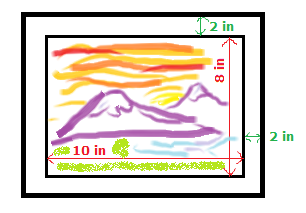2012 AMC 8 Problems/Problem 6
Problem
A painting with dimensions 10 inches by 14 inches is placed in a picture frame (of constant width), increasing its area to 221 square inches. How many inches is the width of the picture frame?
![]()
Solution
First, we start with a sketch. It's always a good idea to start with a picture, although not as detailed as this one. (Tip: On the actual AMC 8 test, you should NOT color your picture in, even if it is beautiful)
In order to find the area of the frame, we need to subtract the area of the photograph from the area of the photograph and the frame together. The area of the photograph is ![]() square inches. The height of the whole frame (including the photograph) would be
square inches. The height of the whole frame (including the photograph) would be ![]() , and the width of the whole frame,
, and the width of the whole frame, ![]() . Therefore, the area of the whole figure would be
. Therefore, the area of the whole figure would be ![]() square inches. Subtracting the area of the photograph from the area of both the frame and photograph, we find the answer to be
square inches. Subtracting the area of the photograph from the area of both the frame and photograph, we find the answer to be ![]() .
.
See Also
| 2012 AMC 8 (Problems • Answer Key • Resources) | ||
| Preceded by Problem 5 |
Followed by Problem 7 | |
| 1 • 2 • 3 • 4 • 5 • 6 • 7 • 8 • 9 • 10 • 11 • 12 • 13 • 14 • 15 • 16 • 17 • 18 • 19 • 20 • 21 • 22 • 23 • 24 • 25 | ||
| All AJHSME/AMC 8 Problems and Solutions | ||
The problems on this page are copyrighted by the Mathematical Association of America's American Mathematics Competitions. 










